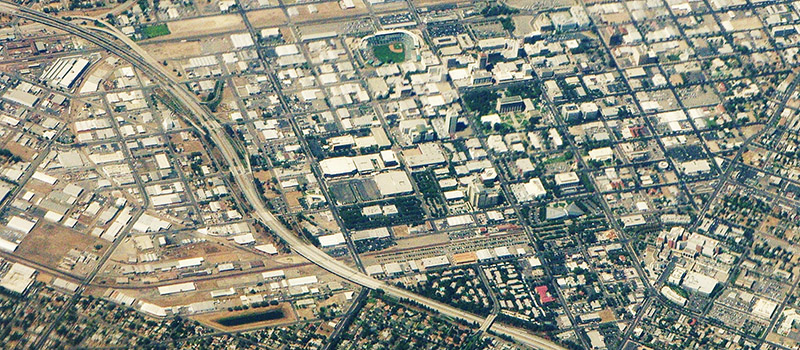
(Photo: Ron Reiring/Flickr)
Originally published on CalMatters
How much is a gallon of milk? And where is it cheapest at the four closest stores?
Charlotte Arellano knows. “It’s $4 for milk, and I’m surrounded by dairy farms,” she says. “I can’t put milk in the fridge for my kids, but we live in the fruit basket of the world. It makes no sense.”
Charlotte, who works and lives in Fresno, has witnessed her community struggle to meet rising costs of living despite working harder than ever.
“A lot of us around here work multiple jobs because we just can’t make ends meet. Jobs are getting tighter and tighter. The more minimum wage goes up, the tighter the jobs get. I was assistant store manager for McDonalds. When minimum wage went to $12 we were told to cut employees – only keep the best and when you rehire, hire the best of the best. It’s difficult when you know these people have families to support like you do.”
Despite efforts at “inclusive economic development” around the state, the voices of workers like Charlotte are too often left out of the design of initiatives intended to help them.
How do you find out what’s making life hard for residents? You ask them. In early 2020, New America CA’s research team, in partnership with Fresno’s DRIVE Initiative, did human-centered interviews with 35 residents to help local government and community development groups understand the struggles and needs of workers in their own words.
Like many Fresnans who also support extended family, even working two to three jobs can leave Charlotte with only $3 in the bank. Her Latinx husband and in-laws, and her Black staff are routinely subjected to racism. And this is not unusual. Many who participated recounted struggling to attain a post-secondary degree, unsafe work environments and experiences of discrimination, illustrating a 2018 Urban Institute report: that Fresno ranks the worst for economic and racial disparity – 59th out of 59 large cities in California. This disparity and not enough “good jobs” gives many the sense – and perhaps betrays reality – that the Central Valley is indeed the forgotten California.
Yet the particulars of when and where life is challenging, and what made it so are not without a means to turn them from powerful stories into much more: real change.
Fresno is fortunate to have such a mechanism. Through DRIVE, a coalition of local civic leaders brought together by the Central Valley Community Foundation, Fresno has been working on inclusive economic growth formally since 2019. The addition of these worker voices and lived experiences has filled in gaps where existing data were not enough to create a complete regional picture. While it may sound glib to suggest that better policy springs from simply talking to people, DRIVE has demonstrated the utility of listening as a pillar of inclusive economic development. This phrase has been in many a mouth, making it important to define what inclusive economic development is – and isn’t.
Inclusive economic development catalyzes a diverse set of local leaders and community members to create and implement a shared regional agenda that expands middle class opportunity. It considers our relationships with, and responsibility to, each other in a new way and puts resident and worker voice at the center and beginning of these efforts. Economic development that is truly inclusive confronts and dismantles racist policies and systems that have historically and continuously obstruct access to opportunity, wealth creation and upward mobility. And it creates greater civic capacity for collective, regional action to successfully implement long-term and inclusive strategies that uproot power imbalances.
These efforts will likely fail when they re-package the status quo and are unwilling to be transformative; are considered important only for Black Indigous and People of Color; or are based on pre-baked strategies that seek community “feedback” as soundbites to co-sign what leaders were unwilling to co-create.
There are two lessons from this. First, it’s critical that leaders across sectors, those in positions of power and privilege, accept their responsibility to show up differently. Second, they need to face racial inequity head on with the nuance required to “call in” prospective allies. However, even while turning the ear of reluctant participants, keep race and equity at the center.
Many Fresnans already had it tough at the start of 2020. Now, the economic fallout from the pandemic, threat of COVID-19 and California wildfires have pushed many already struggling residents past the brink, putting them even more in need of a plan that actually works for them.
What Fresno – and California communities like it – need is bigger than just good jobs, worker programs and training. We must transform the social contract within local communities, as we are tethered within the same social, health and economic fabric. This moment of national crisis needs a silver lining, and it is the increased urgency to approach inclusive recovery differently – to build new strength from a forced tear down. So, we implore that those with grasstop platforms heed grassroots expertise and listen to seldom-heard narratives of people who are indeed counting costs, of milk and everything else.
Autumn McDonald is a New America senior fellow and head of New America CA.
Ashley Swearengin is president and CEO of the Central Valley Community Foundation.

